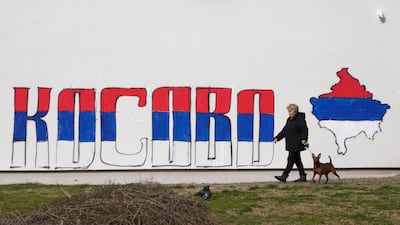What’s in a name? In Kosovo it’s everything. Most of the 100,000 Serbs still living there call it Kosovo and Metohija. If you are among the 1.8 million Kosovan Albanians, you are in the Republic of Kosovo. Fifteen years on from Pristina’s declaration of independence from Serbia the matter is still not settled and the potential for violence remains.
Kosovo, which neighbours four Western Balkans countries, is often called the “black hole of Europe”. The rule of law is shaky, and the land is crisscrossed with routes for trafficking drugs, guns and people. A settlement with Belgrade, resulting in better cross-border co-operation, would help the fight against the smuggling trade as would a crackdown on some officials in both countries who are allegedly involved in criminality. Some made their names and fortunes during the Kosovo war.
In 1999 Nato intervened in the conflict between Serbia and the Kosovan Liberation Army, bombing the Serb forces out of the province. Fearing retribution from the returning Kosovans who had been forced from their homes 100,000 of the then 240,000-strong Serb population fled north. Over the next few years, amid a campaign of violence against them, another 40,000 left.
Serbs view Kosovo as the birthplace of their culture. The word Metohija is of Greek origin and roughly means “land of monasteries”. The oldest churches there date back to the 6th century and for centuries Christians were the majority population. That began to change in the 15th century with the arrival of Islam and the conquering Ottoman Turks. Relations between Orthodox Serbs and Muslim Kosovars have never been good, with both taking the opportunity to discriminate against the other depending on which had the upper hand. Historical memory is selective on both sides, and on both sides the scars run deep.

Persecution of Kosovars intensified during the Slobodan Milosevic era and led to the uprising, which in turn led to the declaration of independence in February 2008. Kosovars regard the word Metohija as a colonial relic used by those who seek to overturn their hard-won sovereignty. Serbs see opposition to the word as an attempt to erase their identity.
Ahead of the 15th anniversary of independence two related things happened. Firstly, there was an uptick in violence, but this often happens ahead of international diplomatic activity aimed at the normalisation of relations. Late last year Kosovo's Serbs put up roadblocks across the country and exchanged fire with local and EU police forces. Belgrade sent extra troops to the border. Then diplomacy kicked up a gear and earlier this month both sides said they were ready to work towards implementing a long-standing EU normalisation plan.
Details are not public, but it’s thought the deal includes respecting borders and the recognition of state symbols. There’s also a fudge when it comes to recognition. Serbia would no longer lobby international organisations to exclude Kosovo but would stop short of recognising it as a state. Both countries would open representative offices in the respective capitals. Then comes the harder stuff.
Pristina had already agreed that eventually Kosovo’s Serbs could form a semi-autonomous association, which the Serb side calls a Community of Serb Municipalities. However, Kosovo’s Prime Minister Albin Kurti insists the name be changed as it is mono-ethnic, that it cannot have powers parallel to the government and that it can only come about after Serbia officially recognises Kosovo as a state. Serbia’s President, Aleksandar Vucic descries these conditions as “a fairy tale”.
Mr Kurti fears the creation of another Republika Srpska – the statelet formed within Bosnia by Serbs after the 1995 peace deal there. It has remained a potential powder keg with factions advocating union with Serbia. He is also aware of Russia’s influence in Belgrade and of how Moscow has used pro-Russian elements in Ukraine to limit Ukrainian sovereignty in its own territory.
So – a long way to go. If the deal did go through it would not only reduce the potential for another war, but unlock inward investment, and allow Spain, Slovakia, Cyprus, Romania and Greece to recognise Kosovo’s statehood. That in turn would be a step along the very long road to EU membership for both countries. The EU five remain nervous about recognising secession from a nation state for their own personal reasons.
Even with a deal, Russia would probably continue to veto Kosovo’s membership at the UN. It is an historical ally of Serbia and seeks to maintain its foothold in the region via Serbia, Republika Srpska and the north of Kosovo where the majority of Serbs live.
During the 1999 Kosovo war Moscow ordered a battalion of about 200 Russian soldiers in 30 armoured vehicles to leave their barracks in Bosnia and get to Kosovo ahead of Nato’s arrival. The Russians eventually became part of the peacekeeping mission and stayed in Kosovo until 2003.
The lesson President Vladimir Putin took from this episode is that if Russia could be made a player using 200 men, it could be made a winner with the whole might of the Russian military in the belief that the West did not have the stomach to stand in its way. This argument held through the war in Georgia, the operation in Syria and the 2014 invasion of Ukraine. It fell apart last year. Nevertheless, the Kremlin uses the “Kosovo precedence” of Nato’s 1999 intervention to prevent ethnic cleansing to argue Russia’s case in Ukraine no matter how hollow this looks to most outsiders.
Both Serbia and Kosovo know that even if they cannot bury their differences, it is in their interests to put them to one side. Another conflict could easily draw in Albania, Macedonia and Bulgaria, and ignite the tensions in Bosnia.
Conversely, mutual recognition and respect can bring stability. It will encourage investment and trade. Names matter. Peace matters more.


